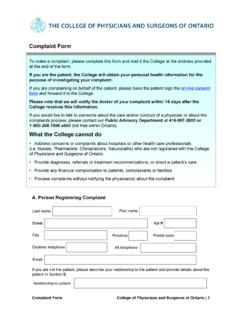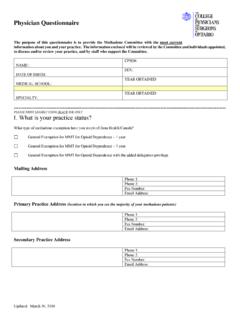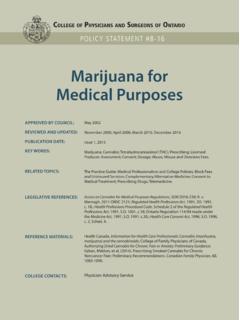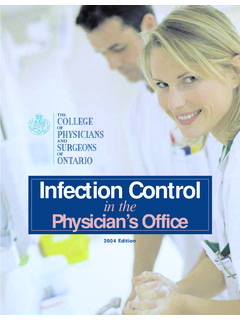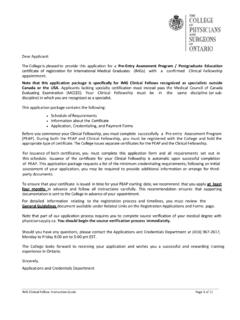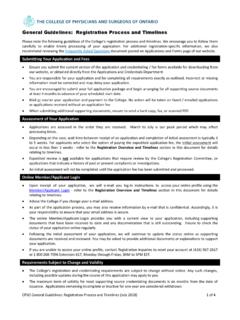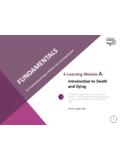Transcription of Medical Assistance in Dying Policy: 10 Things The …
1 Medical Assistance in Dying Policy: 10 Things The Patient Should Know 1. Why did the federal government introduce new law that is not the result of external pressure; and on Medical Assistance in Dying ? v. Provide informed consent to receive Medical Assistance in The federal government's law on Medical Assistance in Dying is Dying after having been informed of the means that are avail- its response to the Supreme Court of Canada's (SCC's) decision able to relieve their suffering, including palliative care. in the case of Carter v. Canada. In that case, the SCC consid- ered the constitutional validity of existing criminal laws that 4. What is a grievous and irremediable Medical condition? prohibited Medical Assistance in Dying (referred to as physician An individual must have a grievous and irremediable Medical assisted death' by the SCC). The SCC ruled that these laws vio- condition to access Medical Assistance in Dying . As set out in the lated the Charter rights of competent adults, who are suffering federal legislation, an individual has a grievous and irremediable intolerably from grievous and irremediable Medical conditions, Medical condition if: and seek a physician's Assistance in Dying .
2 A. Th ey have a serious and incurable illness, disease or dis- The SCC suspended its decision to allow the federal and/or ability;. provincial governments time to design a framework to govern b. They are in an advanced state of irreversible decline in the provision of Medical Assistance in Dying . In response, on capability;. June 17, 2016, the federal government passed legislation to c. That illness, disease or disability, or that state of decline allow eligible adults to request Medical Assistance in Dying . The causes them enduring physical or psychological suffering legislation includes rules on who is eligible for Medical assis- that is intolerable to them and that cannot be relieved under tance in Dying and outlines safeguards that must be followed to conditions that they consider acceptable; and ensure public protection. d. Their natural death has become reasonably foreseeable, tak- ing into account all of their Medical circumstances, without 2.
3 What is the meaning of Medical Assistance in Dying ' a prognosis necessarily having been made as to the specific and what does the term encompass? length of time that the individual has to live. As set out in the federal legislation, Medical Assistance in Dying refers to an individual seeking and obtaining the Assistance of a 5. Does an individual have to be terminally ill to meet physician or nurse practitioner to end his/her life. This assis- the eligibility criteria for Medical Assistance in Dying ? tance encompasses two potential scenarios: The federal government has stated that an individual need not have a terminal condition to be eligible for Medical Assistance i. The physician or nurse practitioner provides the patient with in Dying . Rather, there must be a real possibility of death, evi- the means to end his/her own life ( , a prescription for a denced by the individual's irreversible decline, within a period fatal dose of medication); or of time that is foreseeable in the not too distant future.
4 The federal government advises that the nature of the illness causing ii. The physician or nurse practitioner is directly involved in the individual intolerable and enduring suffering, and any other administering an agent to end the patient's life. This is often Medical conditions or health-related factors such as age and/or referred to as voluntary euthanasia. frailty, are to be considered in assessing the individual's trajec- tory towards death. 3. What criteria must be met in order for an individual to access Medical Assistance in Dying ? 6. Is Medical Assistance in Dying now legally available in As set out in the federal legislation, for an individual to access Canada? Medical Assistance in Dying , he/she must: Yes, Medical Assistance in Dying is now legally available in Canada. This means that Medical Assistance in Dying is a legal i. Be eligible for publicly-funded health services in Canada; option for adults who meet the eligibility criteria set out in the ii.
5 Be at least 18 years of age and capable of making decisions federal law. with respect to their health;. iii. Have a grievous and irremediable Medical condition (in- cluding an illness, disease or disability);. iv. Make a voluntary request for Medical Assistance in Dying CPSO FAQs 1. Medical Assistance in Dying Policy: 10 Things The Patient Should Know 7. In order to access Medical Assistance in Dying , the pa- 10. What if I am interested in learning more about or tient must be capable of making decisions with respect pursuing Medical Assistance in Dying and my physician to their health. Does this mean the patient has to be has a moral or religious objection. How do I get the help capable when they request Medical Assistance in Dying , I need in this circumstance? when they receive Medical Assistance in Dying , or both? In the physician-patient relationship, physicians must prioritize The federal legislation specifies that Medical Assistance in Dying patient interests.
6 In keeping with this principle, the College's is available only to individuals who are capable of making deci- Medical Assistance in Dying policy requires that where a physi- sions with respect to their health. In accordance with the legisla- cian declines to provide Medical Assistance in Dying for reasons tion, the patient must provide the physician or nurse practitio- of conscience or religion, the patient must not be abandoned ner with their expressed consent immediately prior to receiving and an effective referral must be provided to the patient in a Medical Assistance in Dying . This means that the patient must timely manner. An effective referral means a referral made in maintain decision-making capacity from the time the request good faith, to a non-objecting, available, and accessible physi- for Medical Assistance in Dying is made, right up to the time at cian, nurse practitioner or agency. which Medical Assistance in Dying is provided.
7 One way for physicians to satisfy the College's effective referral 8. Can requests for Medical Assistance in Dying be made requirement is to contact Ontario's Care Coordination Service through an advance directive, or the patient's substi- (CCS). The CCS would then connect the patient with a willing tute decision-maker? provider of MAID-related services. For more information on All requests for Medical Assistance in Dying must be made di- and examples of what constitutes an effective referral', please rectly by the patient, and not be through an advance directive, see document titled Fact Sheet: Effective Referral, available on the or the patient's substitute decision-maker. The federal legislation College's website. specifies that Medical Assistance in Dying is available only to individuals who are capable of making decisions with respect to Patients may also contact the CCS directly to receive informa- their health. The individual's decision-making capacity must be tion about end-of-life options in Ontario, including informa- maintained right up until the time Medical Assistance in Dying tion on hospice care, other palliative care options in their is provided.
8 Communities, and Medical Assistance in Dying . Patients can also call the CCS to request to be connected to a physician or nurse A substitute decision-maker would only make decisions for a practitioner who provides Medical Assistance in Dying services, patient in circumstances where the patient no longer has capac- such as eligibility assessments. The CCS can be reached toll free ity. Similarly, advance directives only take effect if the patient by calling 1-866-286-4023. loses capacity. With respect to Medical Assistance in Dying , therefore, substitute decision-makers do not have a role to play, and advance directives are not applicable. 9. Could an individual with a mental illness potentially meet the criteria for Medical Assistance in Dying ? Individuals with mental illness are not prevented from accessing Medical Assistance in Dying , as long as they meet the criteria for Medical Assistance in Dying , as set out in the federal legislation.
9 This includes the requirement that the individual who is seeking Medical Assistance in Dying has decision-making capacity. The federal government has stated that where an individual is suffer- ing only from a mental illness, the criteria for Medical Assistance in Dying would not be satisfied. The federal government has committed to conducting further studies to examine the legal, Medical and ethical questions that arise where individuals, who suffer from mental illness only, are seeking a medically assisted death. CPSO FAQs 2.

